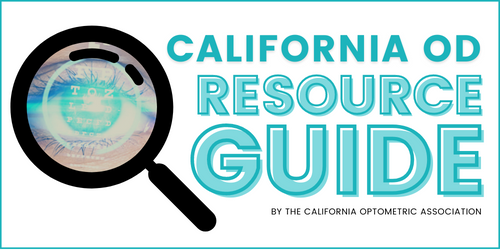Chaptered Bills Affecting the Practice of Optometry, 2016
Below are measures approved by Governor Jerry Brown following the end of the 2016 Legislative Session affecting optometry. Unless stated otherwise, all new laws listed below take effect January 1, 2017.
AB 72, Bonta, D, Health care coverage: out-of-network coverage.
Prohibits non-contracted providers who provide covered health services from billing more than the same amount the enrollee would pay for the same services received from a contracting health professional. This prohibition shall not apply if an enrollee has coverage for out-of-network benefits provided specified conditions are met by the health care provider. Additionally, requires health plans and health insurers to reimburse to non-contracting health professionals the greater of the average contracted rate or 125 percent of the amount Medicare reimburses on a fee-for-service basis for the same or similar services in the general geographic region in which the services are rendered. These provisions take effect July 1, 2017.
AB 1244, Gray, D, Workers' compensation.
Requires the suspension of any health care provider from participating in the workers' compensation system if the provider has been convicted of any felony or misdemeanor involving fraud or abuse of the Medi-Cal program, Medicare program, or workers' compensation system; if that provider's license, certificate or approval to provide health care has been surrendered or revoked, or if that provider or entity has been suspended, due to fraud or abuse, from participation in the Medicare or Medicaid programs.
AB 1676, Campos, D, Employers: wage discrimination.
Existing law prohibits an employer from paying an employee less than the rates paid to employees of the opposite sex for equal work on jobs the performance of which requires equal skill, effort, and responsibility, and which are performed under similar working conditions. This measure clarifies that a prior salary cannot, by itself, justify any disparity in wage between employees of the opposite sex. Any employer who violates this provision is liable to the employee affected in the amount of the wages, and interest thereon, of which the employee is deprived, and an additional equal amount as liquidated damages.
AB 1732, Ting D, Single-user restrooms.
Requires all single-user toilet facilities in any business establishment, place of public accommodation or government agency to be identified with signage as “all-gender toilet facilities” and allows for inspection to ensure compliance. This bill takes effect March 1, 2017.
AB 2093, Steinorth, R, Disability access.
Requires property owners or lessors to notify prospective tenants of a commercial property's compliance with construction-related Americans with Disabilities Act (ADA) accessibility standards. Establishes a presumption that making necessary repairs or modifications to meet ADA standards are the responsibility of the commercial property owner or lessor unless otherwise agreed upon by the parties to the lease or rental agreement. If the premises have not been issued a disability access inspection certificate, the parties must mutually agree on the arrangements for the time and manner of the inspection, the payment of the associated fee, and the cost of making repairs, as specified.
AB 2744, Gordon, D, Licensed health care providers: advertising.
Clarifies that online advertising through a third-party involving the purchase of vouchers for services offered by a health care professional is allowed under the law provided specified conditions are met.
SB 482, Lara, D, Controlled substances: CURES database.
Requires a health care practitioner authorized to prescribe controlled substances to consult the CURES database to review a patient's controlled substance history no earlier than 24 hours, or one business day, before prescribing the controlled substance to the patient for the first time, and at least, once every four months thereafter if the substance remains part of the treatment of the patient.
SB 1039, Hill, D, Optometry in retail settings: business relationship violations.
Authorizes the State Board of Optometry to issue a citation containing an order of abatement, an order to pay an administrative fine not to exceed $50,000 per investigation, or both, for violating the permitted relationship between an optometrist and any registered dispensing optician or optical company.
SB 1063, Hall, D, Wage discrimination: race or ethnicity.
Prohibits an employer from paying any of its employees at wage rates less than the rates paid to employees of another race or ethnicity for substantially similar work. Violation of this is a misdemeanor and is punishable by a fine of not more than $10,000, or six months imprisonment, or by both.
SB 1478, Committee on Business, Professions and Economic Development, Healing arts.
Exempts licensees from the CURES fee requirement of $6 annually if issued a retired or inactive status license and whose retired or inactive status license does not authorize the prescribing of controlled substances. This provision takes effect July 1, 2017.
1.png)

1.png)


.png)




.png)
.png)
.png)
.jpg)
.png)
.png)
.png)
.png)
.png)
.png)

.png)

.png)
.png)
